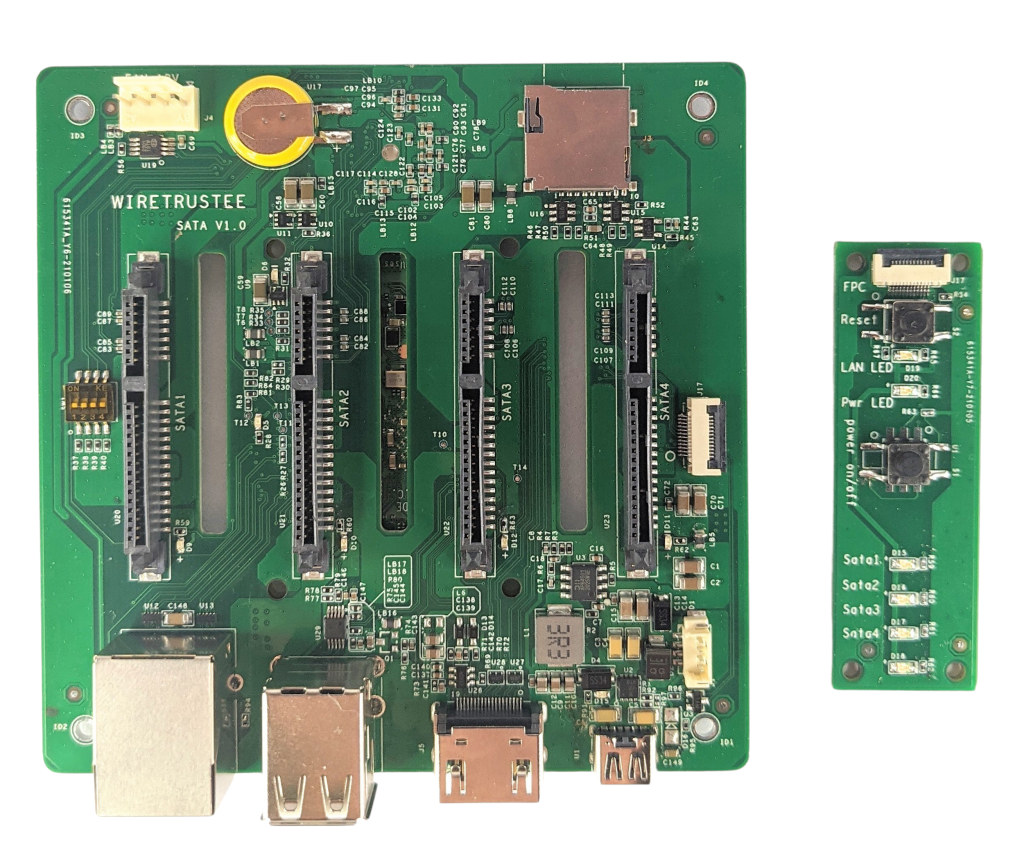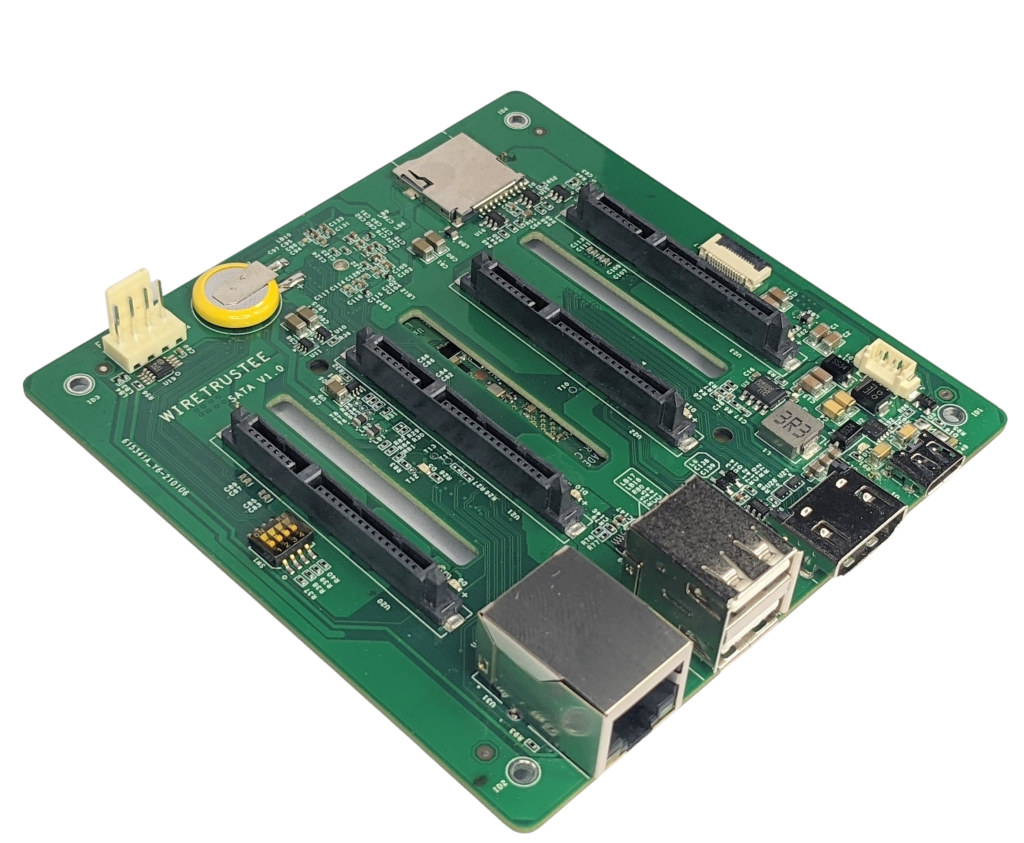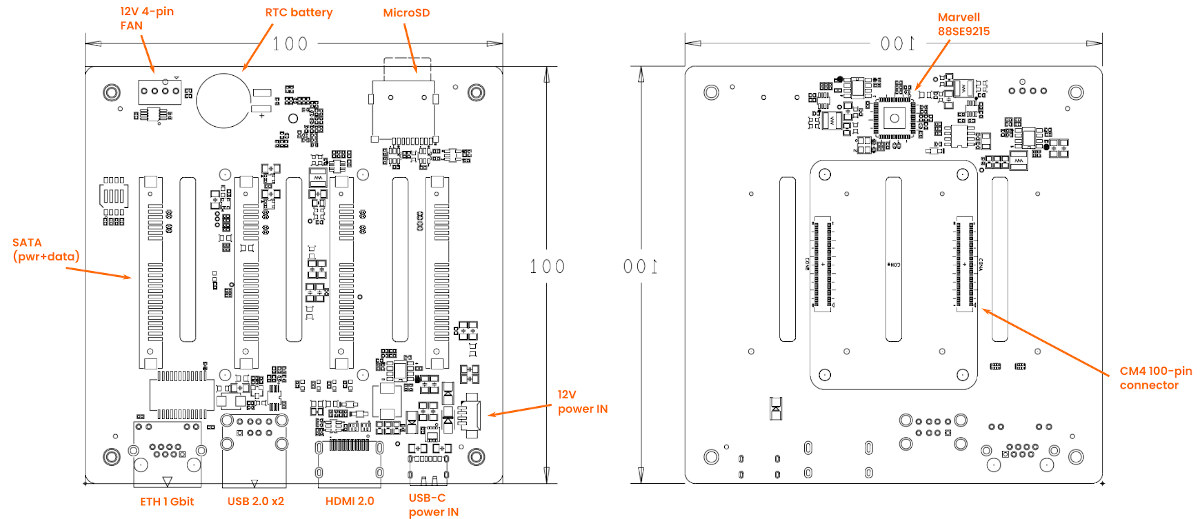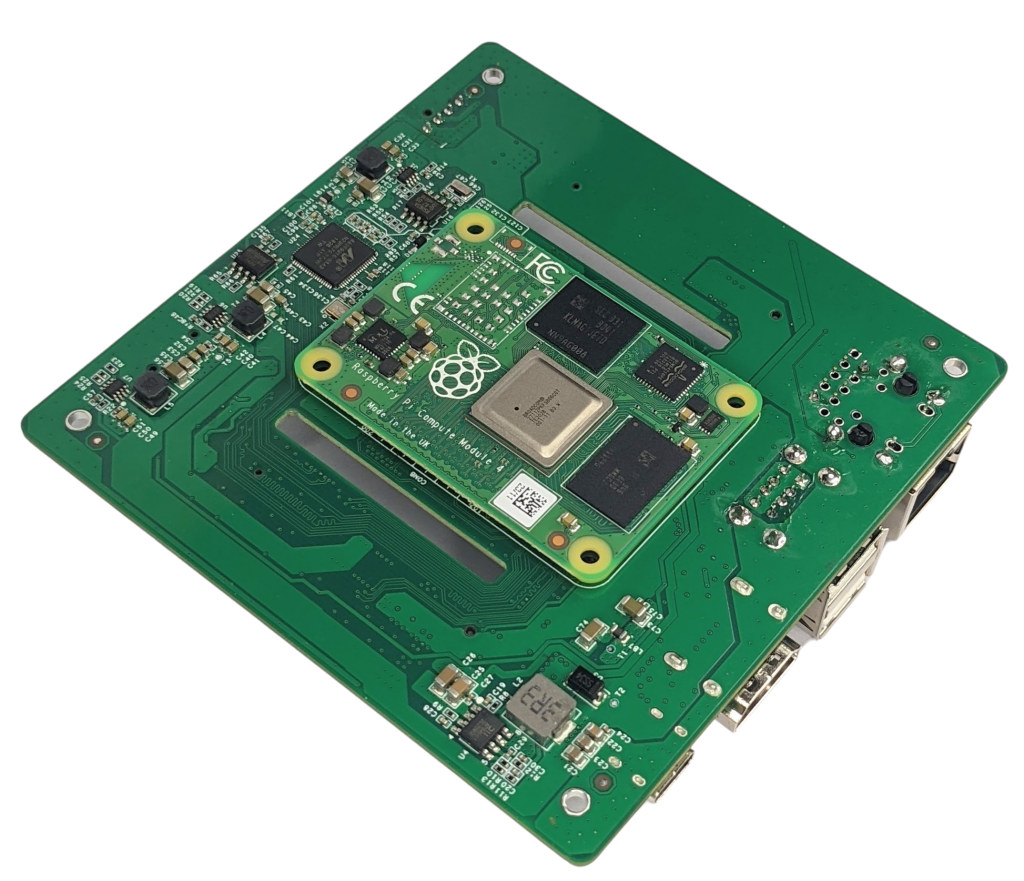Broadcom BCM2711 processor comes with a PCIe interface that is used for the USB ports on the Raspberry Pi 4 SBC, but that is exposed through the board-to-board connectors of Raspberry Pi Compute Module 4, aka Raspberry Pi CM4, and allows all sort of designs.
So far we’ve mostly seen this PCIe interface used for M.2 expansion slots on devices ranging from industrial computers to carrier board such as Piunora or Gumstix Raspberry Pi CM4 development board. But Wiretrustee had a different idea and designed carrier board with Marvell 88SE9215 PCIe to SATA controller and offering four SATA connectors to build a 4-bay NAS with Raspberry Pi CM4 module.
Wiretrustee carrier board specifications:
- Supported SoM – Raspberry Pi Compute Module 4 and 4 Lite
- Storage
- 4x SATA 2.0 via Marvell 88SE9215 (PCIe 2.0 x1 to 4 6Gb/s SATA ports, no HW RAID) chip tested at a write speed of ~220MB/s on each of the SATA ports (not simultaneously)
- MicroSD card slot
- Video Output – HDMI 2.0 up to 4Kp60
- Networking – 1x Gigabit Ethernet port
- USB – 2x USB 2.0 ports
- Misc – 4-pin fan, RTC + battery, external control board connected via FPC cable with more LEDs, reset and power buttons.
- Power Supply – 5V via USB-C port up to 5A max, or
- Dimensions – 100×100 mm

220MB/s for one SATA port at a time may seen relatively slow, and indeed, the developer explains performance was not the goal on Reddit:
I’m not chasing high IO therefore a limitation of PCIe x1 wasn’t a real problem to me. I still think you could have a decent speed with only one lane especially for my case where I anyway will connect and download/upload files from/to the home network via the internet
The initiative actually started as a software project with a goal of developing personal cloud storage + VPN solution, and they started to work on an ODROID board, but with the launch of RPi CM4 decided to build their own board.
There’s close to no information about the software right now, and the hardware is not available yet, with Wiretrustee planning to launch it via Crowd Supply, and they will make sure it works with both 2.5-inch and 3.5-inch drives. You can still influence design choices on the Reddit thread, and more details may be available on Wiretrustee website. If you’d like a Raspberry Pi 4 based NAS, but are not quite the patient type, there’s always ROCK Pi SATA HAT.
Via Hackster.io

Jean-Luc started CNX Software in 2010 as a part-time endeavor, before quitting his job as a software engineering manager, and starting to write daily news, and reviews full time later in 2011.
Support CNX Software! Donate via cryptocurrencies, become a Patron on Patreon, or purchase goods on Amazon or Aliexpress








> 220MB/s for one SATA port at a time may seen relatively slow
That’s the result of insufficient testing (block size too small or SSD/HDD performance limited). With such a 88SE9215 controller, a single Gen2 PCIe lane and a quad core A72 CPU with appropriate IRQ affinity settings around 400 MB/s will be possible per port (but not simultaneously of course).
Too bad they didn’t choose the 5-port JMB585 instead of the old Marvell part…
Can you daisy chain two drives per sata port, on a uncased ODROID-HC4 ?
> 5V via USB-C port up to 5A max, or 12V/5A via 4-pin header
According to the Reddit thread he plans on supporting 12V via barrel plug with next revision. The pricing discussed there (100€-140€ all included) and the idea of 5V at 5A via dumb USB-C (porting the classic Raspberry Pi undervoltage drama to a ‘NAS design’) let me believe it’s better to wait for someone from China doing something similar with a JMB585 and sane powering for half the price…
Cool, looks like it might be a fitting upgrade to my evercube
Honestly, I don’t get the point of such boards.
For the price of a compute module and a carrier board, you can also buy a mini or micro-ITX board, that’ll give you bigger memory options, AMD64 cores, 4-6 SATA6, m.2, 1-2 1Gbit Ethernet, HDMI, DP, VGA, and, and, and.
> For the price of a compute module and a carrier board
…this carrier board.
If such a carrier board in Mini-ITX format for ~40 bucks with wide range voltage input would allow to use old 19V laptop power bricks providing 5 SATA ports via an JMB585 then it would be a nice drop-in replacement for a failing/dead motherboard and would make some sense.
At this price point with such serious design flaws (5V/5A) it will for sure only attract a rather special target audience.
Yeah like everyone else says; it could be designed a lot better. An mmc flash would make it more permanent platform.. i wouldn’t trust running a nas off of an sd card.. Usually, the sata backplane card would be perpendicular to the power/data ports. Mounting drives this way seems really weird to me.
> i wouldn’t trust running a nas off of an sd card
That’s only an issue if you run a distro that ignores the flash memory problem (e.g. plain Raspbian or whatever it is called these days). ‘Logging to death’ can be easily avoided with SD cards, just check how it’s done for example with OpenMediaVault’s flashmemory plugin.
You can always get a Raspberry Pi Compute Module 4 with eMMC flash if that’s a concern.
Like previous Raspberry Pi Compute Modules it’s possible to buy CM4s with on-board eMMC flash – they do CM4 versions with and without Wireless, with options of 1/2/4/8GM of RAM, and options of 0/8/16/32GB of on-board eMMC flash. No need to put eMMC on the carrier board.
I guess the very easy and cheap route otherwise would be a RockPro64 and a controller card such as one using ASMedia ASM1166 chipset? 🙂